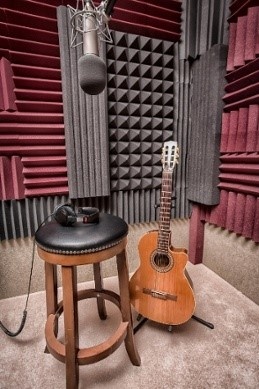There are few things in life more exciting than finishing a personal and creative project. Music is no exception.
When you finish your musical project and are proud of it, you want the world to hear it.

There are definitely DIY tactics to getting your music out there in the world, but it is understood that record labels are the more direct route to success and promotion. The majority of well-known artists and bands have found their achievements through record labels.
So how do you go about contacting a record label?
1. Make Unique, Remarkable Music
This should be obvious, but the first step is to create music that is innovative and lingers in your mind once the track is over.
A song can have amazing verses or great beats, but if you're missing a part or everything isn't finalized, there will be 0% chance a record label will take it seriously. They don't deal in hype or what you're "imagining" will happen next on the track.
Songs tend to evolve, but make sure when you start thinking about submitting demos your songs are, for all intents and purposes, "finished."
Naturally, all music is inspired by previous works. You don't need to completely reinvent the wheel, but stay in the category of "inspired by" and away from terms like "imitation."
2. Dress Up Your Music
 With the access people have to digital software for recording and audio mastering, the days of sending "rough" demos in hopes that the pure heart and soul of the song shines through has died.
With the access people have to digital software for recording and audio mastering, the days of sending "rough" demos in hopes that the pure heart and soul of the song shines through has died.
Whether you look at that like a positive or negative is up to your own perspective. However, it is the way it is.
Take the time to master your tracks. Presentation is essential.
The record labels do not expect the same quality as their own studios or if you paid $1000 for a recording studio. However, it should sound better than if you downloaded a recording app and stuck your phone in the middle of the guitar and bass amps, PA system, and drumset.
If you're just a vocalist submitting a demo, using software is still helpful but don't go crazy with anything like autotune. Mastering your tracks is not the same as sending false expectations.
Additional Resources:
Digital Audio Workstation Software
5 Necessary Pieces of Equipment For Home Recording
3. Less is More
Even if you think you're music is the best thing since sliced bread, you have to consider the volume of submissions each and every record label is acquiring yearly.
You don't want to think about the recording labels during the writing process because the music should still be very organic and not forced. However, now that you've created a substantial amount of music, the best idea is to submit 2 or 3 songs tops. Two is preferred.
At this point, this may feel like you're being forced to choose which of your children are your favorite. Think about these facts when deciding which songs to send:
- Does the song contain meaningful lyrics?
- Is the song titled appropriately with a name the label will take seriously?
- Is it a good representation of your band as a whole?
- Does it pop? Slow burners can be fantastic, but demo submissions are all about quick first impressions. Choose songs that are front loaded.
These questions should help narrow down your options to a couple good, solid choices.
4. Do Your Homework
You aren't the best fit for every label, and that's okay. That also means, in turn, that every label isn't a good fit for you as a musician, either.
Take a little time and do some research on some record labels that could seriously benefit you. Sending out your demos to any random record label is just wasting your time and theirs.
An excellent place to start is to narrow down labels by genre.

You may discover a great sounding label, but if you sing R&B and they sign folk and country bands, chances are they are not the right destination for you.
Another useful strategy is checking out where your biggest inspirations were signed. At this point, chances are they have moved on and signed on to a much bigger record label. However, look for who signed them first or second. Compile a list of a few of your favorite artist's first labels and go from there.
Once you choose a couple of labels that seem to match, take the time to learn a little bit about each label. Read the "about me" section, and look up a few of their currently signed musicians. You don't have to know the label like the back of your hand, but familiarization can be helpful.
5. Individualize Your Submissions
You may have a favorite landing destination, but don't limit yourself.
Pick a few different labels that match your music well and submit, submit, submit. Make sure you don't make carbon copy submissions, though.
You don't want to patronize the labels and certainly don't claim your "awesome and radical music will be their biggest hit and bring them to the promise land." Humility and individuality are imperative. Address each record label separately and add a few little details to show you've done your homework and care.
Each record label is different so you'll want to check their site to see their preferred method of receiving demos.
Physical demos are just about obsolete, so keeping it digital is the best and fastest option.
What you want to look out for is whether the record label wants:
- The demos submitted directly to them as files
- A link for them to follow to your couple of songs
For the latter option, a great resource to utilize is SoundCloud.
Just be sure that the record label is directly led to your specific couple of demo submission tracks. Don't make them guess or remember song titles to sift through a whole album of tracks.
If you don't hear back from the label, even up to a month, don't stress out. Demo submissions, unfortunately, are lower on their totem pole of urgent matters.
A polite follow-up email is not a terrible idea, but don't pester them and don't be afraid of rejection. Some labels may even offer constructive criticism if you're lucky.
Being told no is a learning experience and remember, it only takes one yes to change everything.
Separate Yourself From the Rest

The music world is a difficult code to crack, especially if you want it to become your livelihood.
Competition is immense, and a lot of luck and timing is necessary.
One way to give yourself an edge is to attend a music college.
At the Atlanta Institute of Music and Media, your intermediate skills will be expanded, and you'll be able to reach your maximum potential. We offer programs for vocals, guitar, bass, drums, keyboard, and even post-production.
For more information on recording and post-production, click the link below and start separating your music talent from the crowd today.














